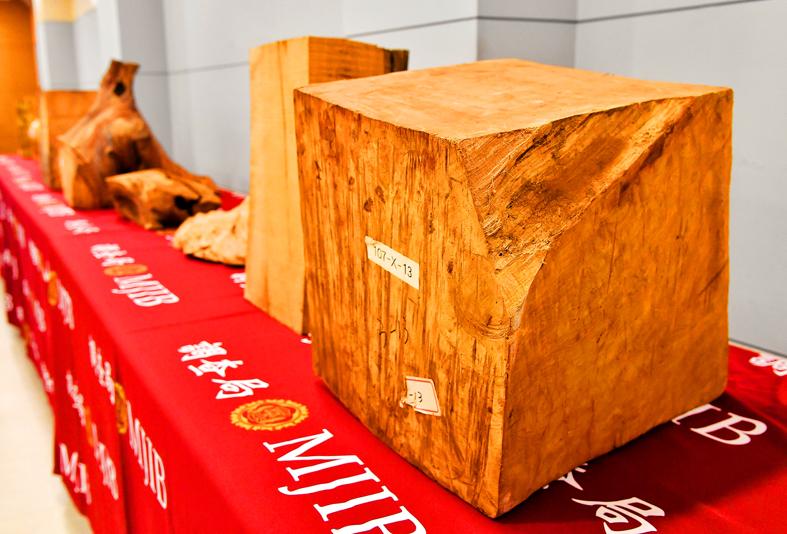To help protect the nation’s forests and guard against illegal logging, the government has established a DNA database for Taiwan cypress and Taiwan cedar trees, Minister of Justice Tsai Ching-hsiang (蔡清祥) said at a news briefing in Taipei yesterday.
The database would enable authorities to identify a particular species, and facilitate prosecution and conviction of illegal logging activities, Tsai said at the Ministry of Justice’s Investigation Bureau (MJIB) office.
The project is the product of a four-year collaboration between the MJIB, the Forestry Bureau and Academia Sinica’s Biodiversity Research Center, he added.

Photo: CNA
“In the past, ‘mountain rats,’ when caught, always claimed that they had only cut down ordinary trees, and not a protected species. Now we can make a positive identification through the database to rebut their claims and bring them to justice,” Tsai said.
A “mountain rat” refers to an individual or group engaged in illegal logging for profit.
“It is not easy to find these mountain rats, as they lurk in remote locations, in difficult terrains in the mountains. Law-enforcement agents cannot spend long periods to track them down,” MJIB Director-General Leu Wen-jong (呂文忠) said.
“It is important to protect Taiwan’s unique species of cypress, cedar and other valuable hardwood trees, and we need science and technology to help us identify materials seized at the crime scene, present this evidence in court and prosecute the offenders,” Leu added.
The project was started in 2017, with extensive work by Forestry Bureau field teams, collecting 600 tree samples in the mountains, focusing on Taiwan cypress and Taiwan cedar, which are classified as protected species under the Forestry Act (森林法), Leu said.
“It is like compiling a fingerprint database for these protected trees and giving them an identification card. The work is ongoing, with more DNA samples being added in the coming years to boost the database’s accuracy in DNA matching,” he added.
Pointing to wood samples confiscated from “mountain rats” during MJIB raids, officials said that DNA genomes from hardy plants have good preservation property.
DNA extracted from driftwood, dead trees cut down many years ago and decomposing trees can be used for identification, and even pinpoint the original location of the tree, they said.
“We will be able to tell then where the illegal logging took place, verify the location and present the evidence in court to get a conviction. This can help us to crack down on these criminal groups, safeguard Taiwan’s forests and protect the environment,” Leu said.

Chinese Nationalist Party (KMT) Chairman Eric Chu (朱立倫), spokeswoman Yang Chih-yu (楊智伃) and Legislator Hsieh Lung-chieh (謝龍介) would be summoned by police for questioning for leading an illegal assembly on Thursday evening last week, Minister of the Interior Liu Shyh-fang (劉世芳) said today. The three KMT officials led an assembly outside the Taipei City Prosecutors’ Office, a restricted area where public assembly is not allowed, protesting the questioning of several KMT staff and searches of KMT headquarters and offices in a recall petition forgery case. Chu, Yang and Hsieh are all suspected of contravening the Assembly and Parade Act (集會遊行法) by holding

PRAISE: Japanese visitor Takashi Kubota said the Taiwanese temple architecture images showcased in the AI Art Gallery were the most impressive displays he saw Taiwan does not have an official pavilion at the World Expo in Osaka, Japan, because of its diplomatic predicament, but the government-backed Tech World pavilion is drawing interest with its unique recreations of works by Taiwanese artists. The pavilion features an artificial intelligence (AI)-based art gallery showcasing works of famous Taiwanese artists from the Japanese colonial period using innovative technologies. Among its main simulated displays are Eastern gouache paintings by Chen Chin (陳進), Lin Yu-shan (林玉山) and Kuo Hsueh-hu (郭雪湖), who were the three young Taiwanese painters selected for the East Asian Painting exhibition in 1927. Gouache is a water-based

Taiwan would welcome the return of Honduras as a diplomatic ally if its next president decides to make such a move, Minister of Foreign Affairs Lin Chia-lung (林佳龍) said yesterday. “Of course, we would welcome Honduras if they want to restore diplomatic ties with Taiwan after their elections,” Lin said at a meeting of the legislature’s Foreign Affairs and National Defense Committee, when asked to comment on statements made by two of the three Honduran presidential candidates during the presidential campaign in the Central American country. Taiwan is paying close attention to the region as a whole in the wake of a

OFF-TARGET: More than 30,000 participants were expected to take part in the Games next month, but only 6,550 foreign and 19,400 Taiwanese athletes have registered Taipei city councilors yesterday blasted the organizers of next month’s World Masters Games over sudden timetable and venue changes, which they said have caused thousands of participants to back out of the international sporting event, among other organizational issues. They also cited visa delays and political interference by China as reasons many foreign athletes are requesting refunds for the event, to be held from May 17 to 30. Jointly organized by the Taipei and New Taipei City governments, the games have been rocked by numerous controversies since preparations began in 2020. Taipei City Councilor Lin Yen-feng (林延鳳) said yesterday that new measures by